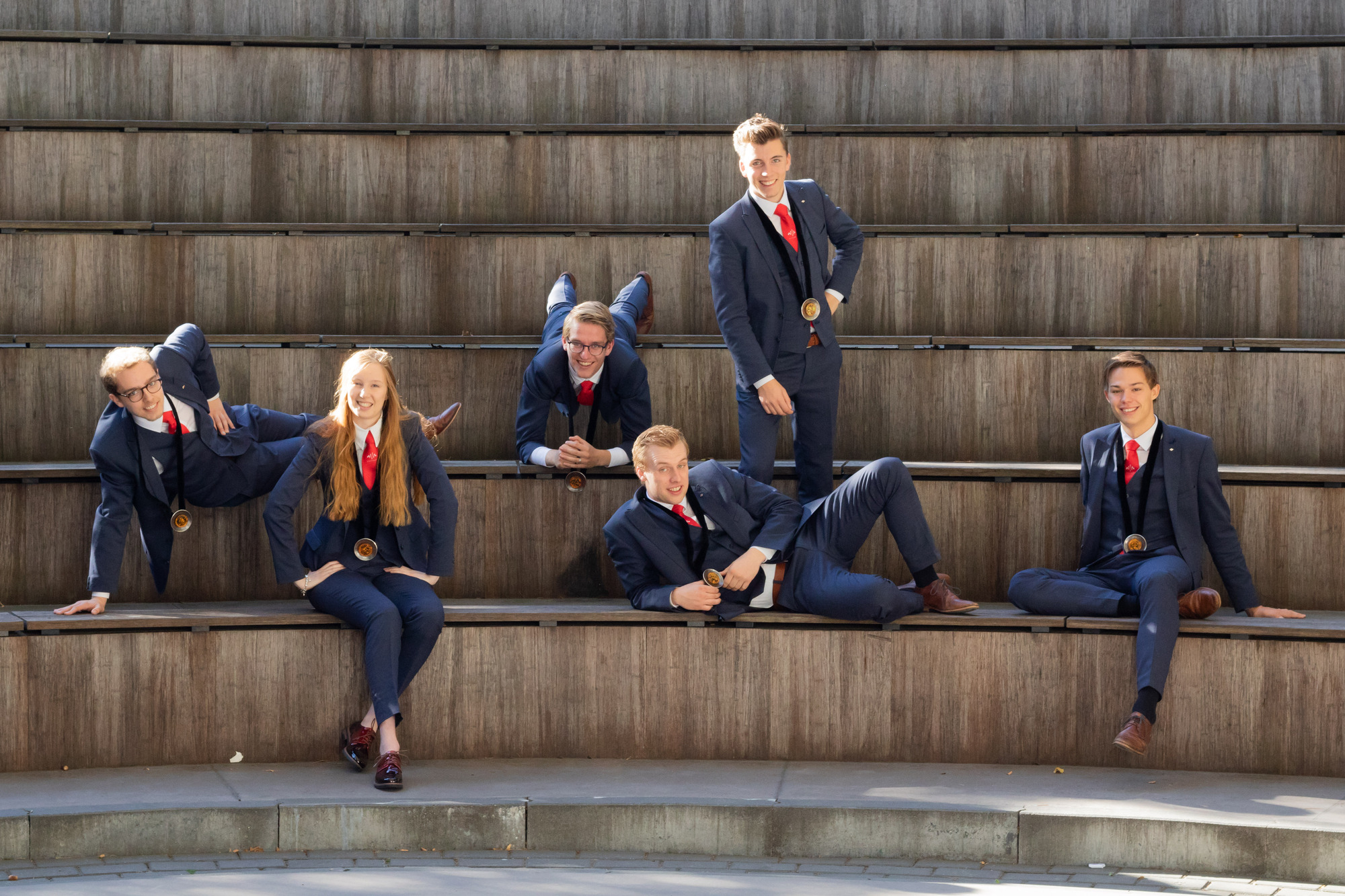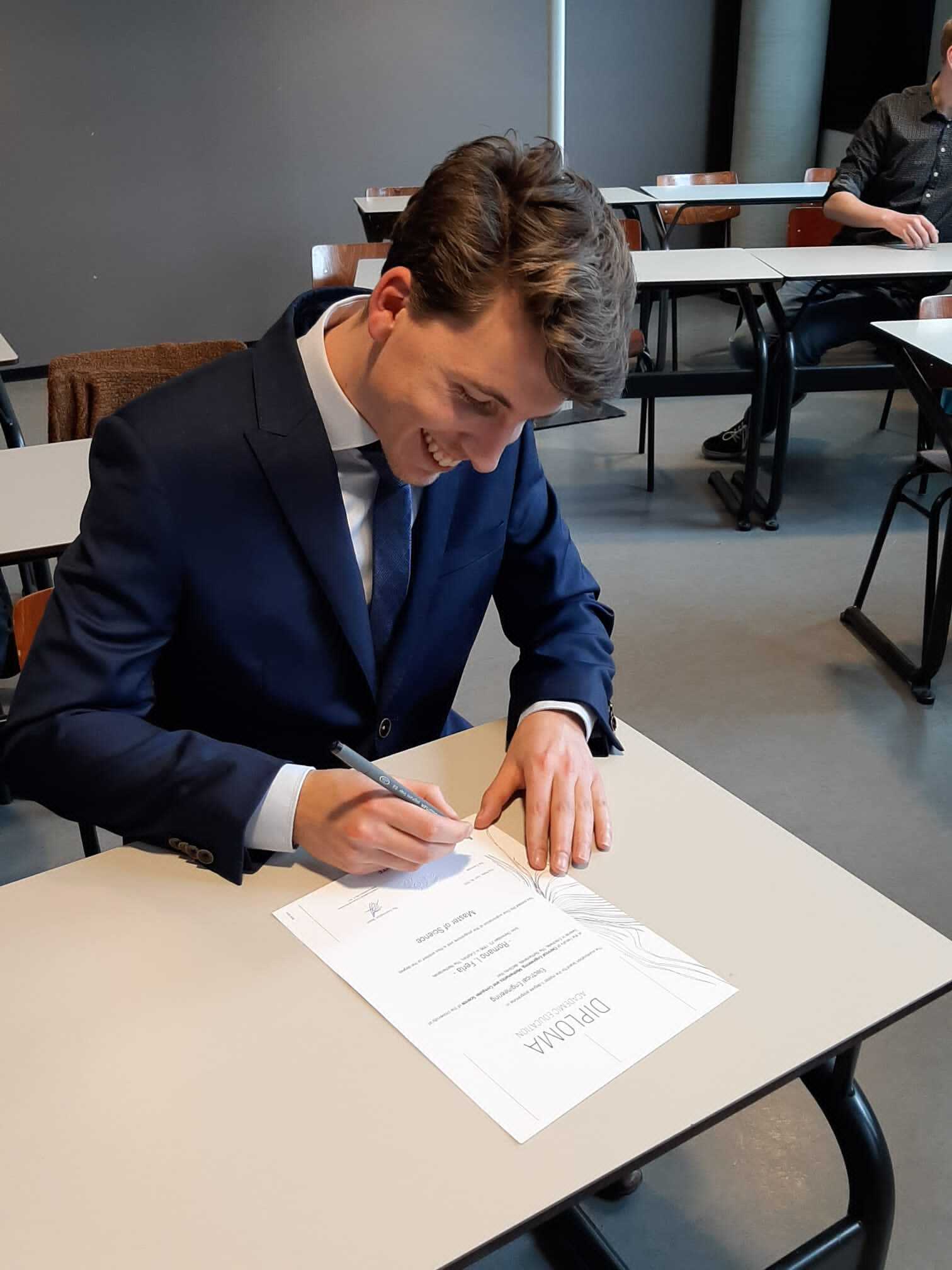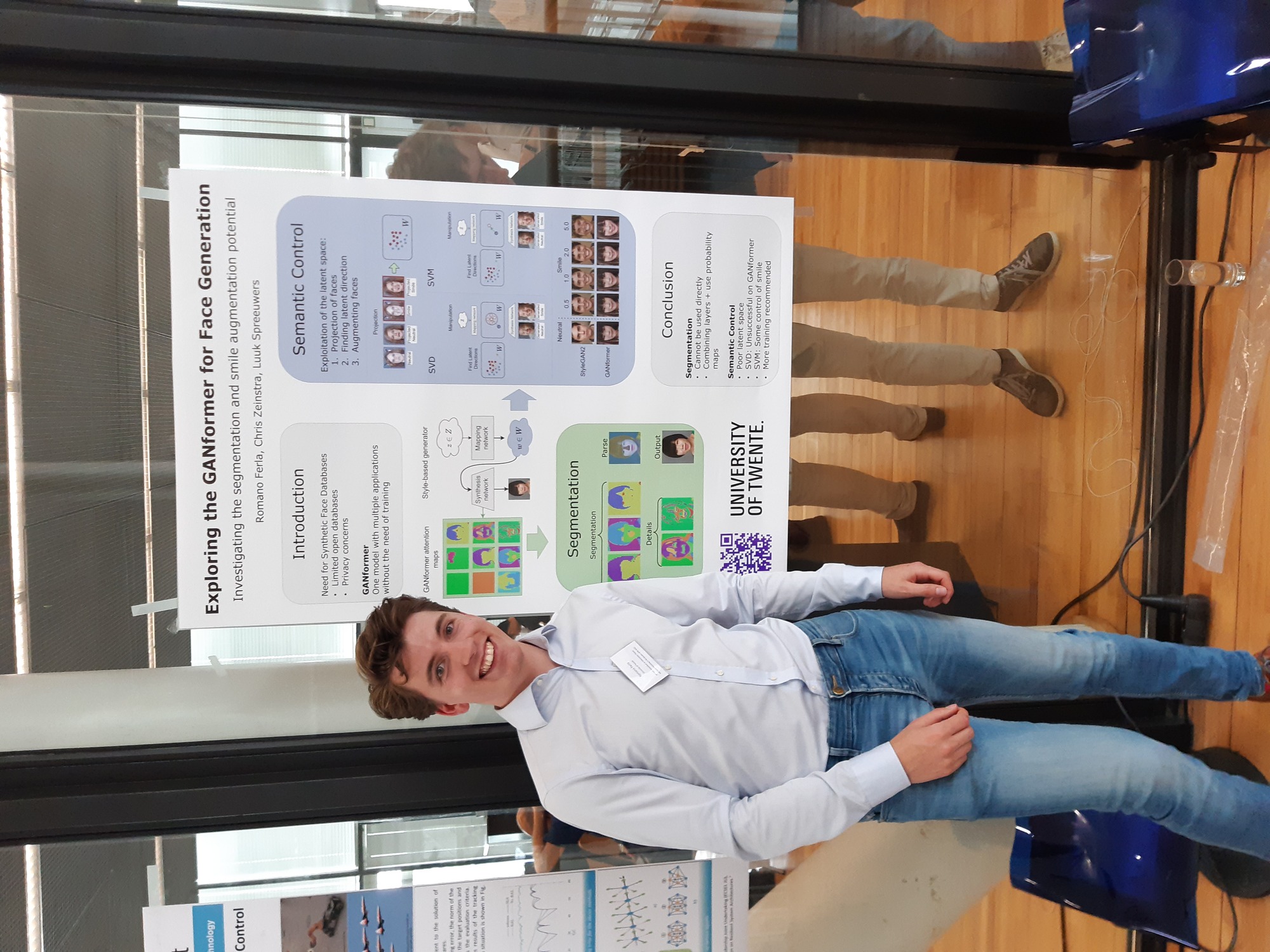Afterlife: Romano Ferla
Looking back at my years as a student, two things pop into my mind. First, I could not have imagined doing all the things I did when I started the study. It has been an awesome ride which I would not regret at all. Second thing: 2015, being eight/nine years ago, sounds not so long ago, though quite far back in time at the same time. Let’s dive into it.
Study Period (2015-2022)
It all started in the years before going to Twente. As an adolescent boy I wasn’t sure what to do after high school. Though something more technical was definitely something I liked, I wanted to keep doing other things I enjoyed as well. Unsure of what to do, I applied for the open days at UTwente for technical computer science and electrical engineering. I was lucky that the UT offered two studies to look at, as electrical engineering wasn’t my first choice. After the open days, I was sure that electrical engineering would be my choice (or did it choose me?).
Fast forward, during the Kick-In, I chose the dogroup Duracell and we had a great time. As mentioned before, I wanted to expand my life besides electrical engineering. So at the start of the study, I promised myself to invest my time in doing other things, I guess that’s why being part of a committee appealed to me so much. I joined the Sjaarscie, applied for the chairman and organised quite a number of successful activities. The best one was an event called the Beer Bingo, our self-made bingo activity in a cantus-like structure, in teams with minigames. As the committee, we were the Beer Meisters, while the guests got free beer and enjoyed the rivalry during the games.
The study went okay, I was active in the association, but travelling each day back and forth (sometimes after drinks) between my parents and the UT took its toll. Together with most of the peers I travelled with, we managed each to find a room within a two month period. I ended up in “Crib Soleil” at the Campuslaan and lived there till the end for a period of six years. One of my housemates joked that I would definitely do a board year, since I was so active at Scintilla, they knew more than me…
The study progressed and I grew (not literally). Looking back I spent a lot of time on things beside my study, such as activism, the gym, going out. I joined SPOCK5 to China in the summer of 2018, in which hiking part of the Wall of China was definitely one of the highlights. The preparation was sometimes tough, with all the work to be done, but the journey was fulfilling and informative. You really get a better view of such a country if you get a look behind the scenes at companies.

Figure 1: A picture of the 89th board, at the amphitheatre
In the months before going to China I joined the candidate board. I remember the time as a candidate board member as a great one. The close collaboration with my fellow candidate board members was joyful. We made our policy plan and were allowed to do a board year by the GMA of Scintilla. This whole period was one of the best experiences I ever had. It felt great to do this for my association, to join the activities and to sit in the board room with all the people passing though, working there, chilling and getting their (healthy) snacks. As the board we got a number of achievements. We improved the SWIPED inventory by adding healthier options such as fruit and yoghurt. We organized the Thoringcar, a trip to the constitution drink of our sister association e.t.s.v. Thor with 40 members of Scintilla. After interviewing other study associations, we organized our first study evenings in the Westzaal during exam periods. All these things are the legacy of our board year and it makes me proud of my board members and I that these things still live on. Including the Smart Fridge for the healthy food.
Besides our shared goals, I learned a lot in my function of Internal and Educational Affairs. You truly get to see the inner workings of the study associations, other organs, committees within the university. While I didn’t notice this directly, in the years after my board year I felt more capable in my study, doing projects on my own and together with others.
While in the bachelors, the study was sometimes not a number one priority due to the activities and parties, I felt the need to focus more on the study after my board year. I did my bachelor thesis at BSS, where I worked on a method to estimate the 3D orientation of a body segment during running with an IMU. During the ten weeks I worked on the theory, did running experiments and processed the measurements in MATLAB. My daily supervisor continued with the work and a couple of years later I became a co-author of a publication.
In the masters I chose the direction of Computer Vision and Biometrics, a specialization I really enjoyed as it links signal processing, mathematics, some software engineering and sometimes machine learning. Unfortunately, in the second quartile of my masters, corona introduced itself to the Netherlands. I remember going to the Spiegel with some peers for, if I recall correctly, an image processing and computer vision course, when the teacher didn’t show up and rumours about a lockdown spread like fire (just like corona). It was a weird, in the beginning exiting and later on more frustrating time.
Looking back it feels like I was in a favourable position. The masters are focussed more on self-study anyway, the projects I did with friends online, I met with (the same) friends online for (board) games and I lived in large house with lots of social contact. Though not everything was great, like everyone I missed the freedom of just seeing people. Every Wednesday morning, the UT thought it would be great to mow the grass just outside my window (during lectures) and with everything closed parties reigned the evenings and nights on the campus, I frequently slept with earplugs.
The corona period really messed with your perception of time, suddenly some friends were graduated and moved on with their life. I started my internship at IMS in Almelo, luckily I worked on a physical setup, so despite corona I could work on location and see my colleagues. The internship was a great experience, putting all sort of skills into practice. After the internship I started orienting on my master thesis, but started working on it in the new academic year.

Figure 2: Signing my diploma
In my thesis I analysed a generative neural network for face generation and how we can exploit it for multiple purposes, such as segmentation and conditioned generation. Together with a handful of friends/board members we all did our graduation project at the same time and worked in a room of CAES on the fifth floor of the Zilverling. While each one of us was working on their own thesis, it really felt as a shared burden, keeping each other in check, doing stand-ups at 9:00, walking during lunchtime. We all graduated during the spring of 2022. My presentation and borrel was on the day before Kingsday and the after party was with Chipz! and Abba Fever at the Q-Music Foute Party, what a finish!
Life After the Study (2022-present)
And suddenly you are done, after nearly seven years of living, studying, working and activism. I remember thinking: is this it? Though I had no time to sit back and enjoy the nothingness. For a small conference I had to make a summary of my paper and a poster, at the same time I was preparing for a small trip to Germany. A few days later, after a long train ride from Hengelo to Pirna, after taking the bus, after pitching the tent and getting stuff for dinner, getting out of my tent and turning around… I saw a man walking up the grass. I looked closely and mildly confident I called the name of an old-Scintilla member, who happened to do the exact same hike on the exact same day as me, somewhere in Eastern Germany. It was great hiking together for the first couple of days on the trail, after we continued each our own path. What are the odds? A small time later, I was in Louvain-la-Neuve to attend the conference with some others of the DMB group. It was interesting to see what other people were working on in different fields such as signal processing, cryptography and communication.
Figure 3: Unexpected hiking with an old Scintilla member

Figure 4: Presenting my thesis at SITB 2022 in Louvain-la Neuve
After all these trips, I had to decide where my life would be going next. Literally, as my girlfriend was living in Arnhem and I resided in Enschede and we both felt to urge to live together. Eventually I decided to leave Enschede behind, as my girlfriend was still studying in Den Bosch (and maybe continue in either Tilburg or Nijmegen), so moving to Enschede wasn’t really an option. That meant finding a job and house in or near Arnhem, which is arguably harder than back in Enschede.
How I found my job was a bit unusual. Via a recruiter agency (wasn’t really enthusiastic about that anyway), I had a job interview at a company (which again I wasn’t really enthusiastic about) which was unsuccessful… However we quickly noticed that and one of the interviewers said that he had a friend working at a company I might be interested in. This interview was on a Tuesday, I got a LinkedIn message on Wednesday, Friday we had our first “job interview” and Monday the second “job interview”. I say “job interview”, because it didn’t feel like that at all. It felt way more like a regular conversation between engineers and our passion about science and technology. One week later the contract was signed and I would start working at Singa B.V. (more on that later).
Finding a house in the peak of the Dutch housing crisis proved to be a harder task. Every morning my girlfriend and I refreshed every website listing houses to find and apply on houses that where within our needs and budgets. After living one and a half month together in a 25m2 attic during a hot summer (and searching non-stop for two months) we moved to our current apartment.
So how is work? It’s great! I really enjoy working at Singa. It is a small company, about 10 persons, mostly engineers of various background. I find it hard to describe what we really are, we are some sort of an engineering company, although it feels sometimes as an external R&D department for other businesses. We take on projects that can really move specific industries forward, coming up with innovative ideas. The solutions are often (3D) vision related in the food and production sectors.
My official title is Vision Engineer, but working in a small company has the benefits that the tasks you work on are varied. So besides computer vision, I work on data science, machine learning, robotics and sometimes have a sort of project lead role. Sometimes I work on concepts of solutions at the start of (sub)projects, often in close collaboration with colleagues. I have done research in how we could use machine learning, which felt similar to my master thesis, without the tedious research question formulation and writing a paper part. Most of my work is on the development of our own product, the TWINport360, a high speed, 360 degrees coloured 3D scanner. Currently I am developing vision inspections of specific products, juggling between how to create such inspection and how that will be useful to the customer. Working on the TWINport360 feels challenging, as a lot of disciplines and stakeholders come together which all influence on another. Another benefit is that you are not only working behind the computer, but working with the physical machine and camera’s.
Working in a small company puts a lot of responsibility on every individual, but in return you get a lot of freedom in your work. After I started at Singa we got the first TWINport360 installed at a customer, we had some insights in the results of the inspections, but couldn’t explain some phenomena. So I built a tool in Python to gather the data and started analysing it, trying to find patterns in all the indicators. Quickly I got some results, showed my colleagues and in no time we had insights of not only the machine itself, but the production process as well. Due to this, we saw an increase in potential of this awesome machine and I got more time to work on data science.
The atmosphere at work is great, even though I’m allowed to work remote, I prefer going to office. My engineering colleagues work on various projects as (embedded) software engineers, mechanical engineers, user experience design and vision engineers. Working at the office enables you to see what cools things they are working on and lets you learn about their expertises. Another fun fact about working at the office is the lunch. We have lunch at work, as in literally making our sandwiches during lunch time with stuff we order weekly. It is a very relaxing and dynamic way of enjoying your lunch break.
All in all, life is thriving. I enjoy my work and living together with my girlfriend. Luckily one of my board members also moved to Arnhem, which is great. Sometimes I find myself being in Enschede for meeting friends or participating in a Scintilla activity, maybe see you there next time?
